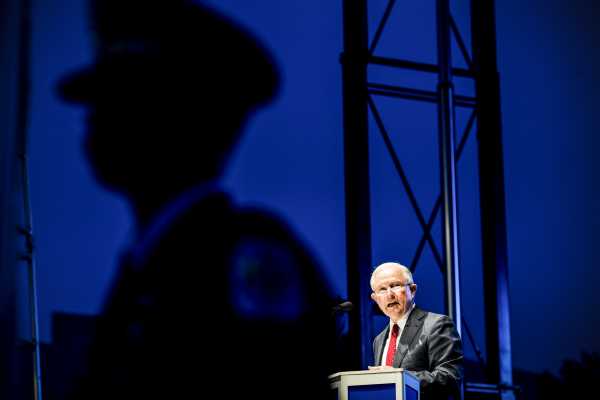
One of the most vocal Christian nationalists in the Trump administration is leaving his post.
Just one day after the 2018 midterms, President Donald Trump asked Attorney General Jeff Sessions to resign, seemingly over lingering anger at Sessions’s 2017 decision to recuse himself from the Trump-Russia investigation.
In so doing, however, Trump has eliminated from his administration one of the highest-ranking, and most vocal proponents of a specifically Trumpian blend of evangelical Christianity and patriotism: one that set the tone for Trumpist rhetoric more broadly. Throughout his tenure as attorney general, Sessions has frequently and consistently conflated American identity and Christian piety, signaling to the 81 percent of white evangelicals who voted for Trump that he was, in essence, their guy.
Earlier this summer, Sessions announced the creation of a religious liberty task force, designed, he said, to combat the “dangerous” specter of secularism in America by ensuring that government offices took the broadest possible view of religious liberty.
He shared a nightmarish — and inaccurate — vision of secular America, “where courts have held that morality cannot be a basis for law, where ministers are fearful to affirm, as they understand it, holy writ from the pulpit, and where one group can actively target religious groups by labeling them a ‘hate group’ on the basis of their sincerely held religious beliefs.” In so doing, Sessions was laying the groundwork for an explicitly (white, evangelical) Christian vision of America to which secularism is an active affront.
Later this year, Sessions made that connection between evangelical Christianity and the Republican Party agenda even more explicit when he cited the Bible verse Romans 13:1 to defend the Trump administration’s migrant family separation policy, of which he was a committed champion. He interpreted the verse, in which the apostle Paul exhorts early Christians not to rise up against the Roman Empire, as meaning that good Christians should never question or doubt their government.
This tactic has been used before in American history, most notably by opponents of the Revolution and by defenders of slavery. In response, Sessions’s own church, the United Methodist Church, formally brought charges of racism, immorality, and heresy against him, although these were ultimately dropped. Just last week, two pastors interrupted Sessions’ speech on religious liberty at a Boston event to protest his hardline views on immigration and refugees.
It’s unclear what the future holds for the office; Trump has announced that lawyer Matthew Whitaker will take over as acting attorney general for the time being. And, with a full 75 percent of white evangelicals supporting GOP candidates in the midterm elections (and 71 percent of white evangelicals approving of Trump’s presidency), Trump may no longer need Sessions — or anyone in that position — to serve as an evangelical mouthpiece.
But as we bid farewell to Sessions as attorney general, we would do well to remember that — despite the president’s well-documented animosity toward him — Sessions was in fact instrumental in making Trumpian nationalist rhetoric what it has now become.
Sourse: vox.com






